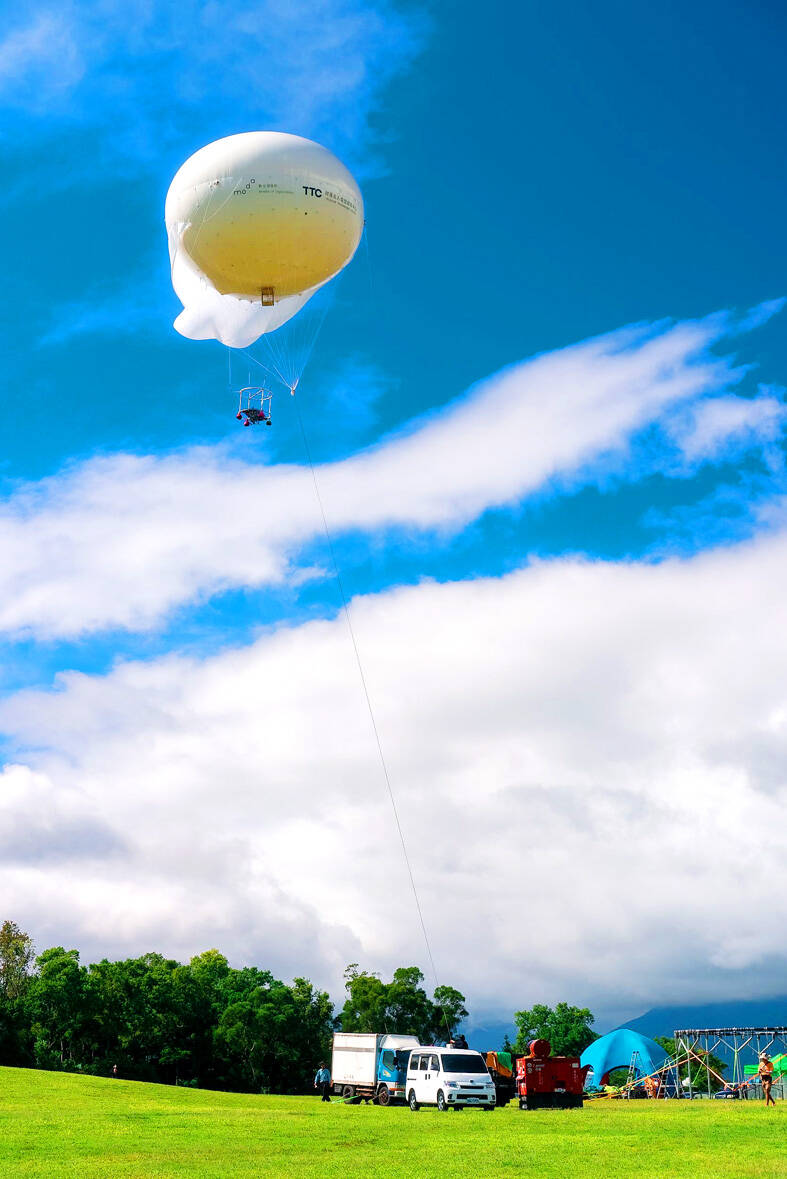The nation is developing a fleet of high-altitude balloons and drones to bolster Taiwan’s communications resiliency, the Ministry of Digital Affairs (MODA) said.
The high-altitude communications balloons and drones would serve as the backbone of an Internet network under the nation’s exclusive control, it said.
In October, Taiwan launched its first high-altitude communications balloon carrying hydrogen fuel cells and mobile base stations, MODA Department of Resource Management Director Niu Hsin-jen (牛信仁) told the Liberty Times (the Taipei Times’ sister paper) in a recent interview.

Photo courtesy of the Ministry of Digital Affairs
The program is a collaboration of the ministry, TH Aero Tech (天興航太), the Industrial Technology Research Institute, the National Taiwan University of Science and Technology, the National Taipei University of Science and Technology and the nation’s three main telecoms, Niu said.
The domestically developed and manufactured system is designed to control telecommunications networks across a 380km2 area during a military conflict or natural disaster, he said.
Balloons offer important advantages over other platforms, such as being inexpensive and easy to mass produce, making them resilient to attrition, he said.
Unlike satellite deployments that require negotiations with foreign governments on orbits and the usage of frequencies, balloons can use any frequency and be deployed at will within Taiwan’s airspace, he said.
The key technologies of the high-altitude balloons’ design and manufacturing are primarily sourced from the US, the UK, Japan and the Czech Republic, none of which pose a potential national security threat, Niu said.
Airships, balloons and drones are the main types of high-altitude station platforms that can be used for wireless communications, he said, adding that balloons were selected for their superior payload, loiter time and technological maturity.
The government did not develop airships due to the heavy energy consumption required for their deployment, Niu said.
The ministry is next year to increase the operational ceiling of balloons to 800m or higher, enable linkage between balloon-run networks to mimic the capability of satellite constellations and develop a drone-based platform station, he said.
The balloon-based, high-altitude platform station remains an experimental technology, but the potential for commercialization is substantial and could be achieved if a certification system is created, he said.

MAKING WAVES: China’s maritime militia could become a nontraditional threat in war, clogging up shipping lanes to prevent US or Japanese intervention, a report said About 1,900 Chinese ships flying flags of convenience and fishing vessels that participated in China’s military exercises around Taiwan last month and in January have been listed for monitoring, Coast Guard Administration (CGA) Deputy Director-General Hsieh Ching-chin (謝慶欽) said yesterday. Following amendments to the Commercial Port Act (商港法) and the Law of Ships (船舶法) last month, the CGA can designate possible berthing areas or deny ports of call for vessels suspected of loitering around areas where undersea cables can be accessed, Oceans Affairs Council Minister Kuan Bi-ling (管碧玲) said. The list of suspected ships, originally 300, had risen to about 1,900 as

Japan’s strategic alliance with the US would collapse if Tokyo were to turn away from a conflict in Taiwan, Japanese Prime Minister Sanae Takaichi said yesterday, but distanced herself from previous comments that suggested a possible military response in such an event. Takaichi expressed her latest views on a nationally broadcast TV program late on Monday, where an opposition party leader criticized her for igniting tensions with China with the earlier remarks. Ties between Japan and China have sunk to the worst level in years after Takaichi said in November that a hypothetical Chinese attack on Taiwan could bring about a Japanese

MORE RESPONSIBILITY: Draftees would be expected to fight alongside professional soldiers, likely requiring the transformation of some training brigades into combat units The armed forces are to start incorporating new conscripts into combined arms brigades this year to enhance combat readiness, the Executive Yuan’s latest policy report said. The new policy would affect Taiwanese men entering the military for their compulsory service, which was extended to one year under reforms by then-president Tsai Ing-wen (蔡英文) in 2022. The conscripts would be trained to operate machine guns, uncrewed aerial vehicles, anti-tank guided missile launchers and Stinger air defense systems, the report said, adding that the basic training would be lengthened to eight weeks. After basic training, conscripts would be sorted into infantry battalions that would take

DEEP-STRIKE CAPABILITY: The scenario simulated a PLA drill that turned into an assault on Taiwan’s critical infrastructure, with the launchers providing fire support Taiwan yesterday conducted this year’s first military exercises at Longsiang Base in Taichung, demonstrating the newly acquired High Mobility Artillery Rocket System’s (HIMARS) ability to provide fire support and deep-strike capabilities. The scenario simulated an attack on Penghu County, with HIMARS trucks immediately rolling into designated launch areas and firing barrages at the Wangan (望安) and Cimei (七美) islands, simulating the provision of fire support against invading forces. The HIMARS are supposed to “fire and leave,” which would significantly increase personnel and equipment survivability, a military official said. The drill simulated an exercise launched by the Chinese People’s Liberation Army (PLA) Eastern